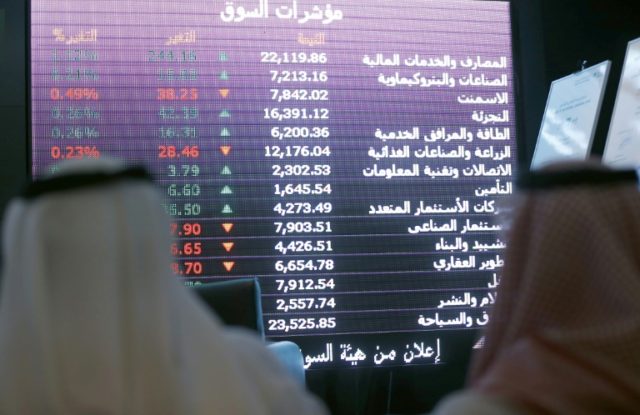Dubai (AFP) – Gulf Arab countries were on Wednesday bracing for the economic and security fallout after President Donald Trump announced the United States was exiting the Iran nuclear deal.
Three countries led by Saudi Arabia immediately backed Trump while Qatar reacted cautiously. Oman and Kuwait also gave circumspect positions.
Trump dealt a hammer blow to the Joint Comprehensive Plan of Action (JCPOA) on Tuesday, removing key sanctions relief for Tehran and casting its future into doubt.
“We will be instituting the highest level of economic sanction,” Trump said, warning that any nation could suffer American economic wrath for aiding the Islamic republic.
Oil prices rose after Trump’s announcement, prompting Saudi Arabia to pledge it would work to prevent supply shortages.
US Treasury sanctions on Iran’s petroleum exports are to snap back in November, just weeks before the expiry of a deal between Saudi Arabia and other major oil producers to cut output.
While Gulf petro-states stand to benefit from a rise in prices, the US move could mean new fissures in the region.
In remarks an hour before Trump’s declaration, senior Kuwaiti diplomat Khaled al-Jarallah said his country stood by the JCPOA as the best option for “stability” in the region.
Qatar, alienated by a Saudi-led boycott, said priority must be given to non-proliferation and preventing a nuclear arms race.
“All parties have an interest to act with restraint and wisdom in the face of this situation and to try to resolve conflicts through dialogue,” its foreign ministry said.
Dubai, whose volume of trade of trade with Iran is in the billions of dollars, saw its stock market dip a noteworthy two percent.
Oman, the back-channel for US-Iran talks that paved the way for the 2015 accord, said Wednesday “the option of confrontation is not in the interest of any party”.
– US clout in doubt –
Anxious Gulf states will be closely monitoring the Russian, Chinese and European response to the US financial gauntlet in the coming weeks and months.
Middle East analyst James Dorsey, a senior fellow at Singapore’s S. Rajaratnam School of International Studies, said any economic showdown will force Gulf states to weigh their responses.
Saudi Arabia, whose heir to the throne Mohammed bin Salman is seeking foreign investment for his “Vision 2030” programme of reforms for a post-oil era, may not put all his eggs in Trump’s basket.
Washington’s allies may find formulas to avoid sanctions exposure.
Oman has plans in the works for a sea pipeline that will import Iranian natural gas.
“The deal has been structured in a way that it is shielded from any potential liability or prosecution under the American sanctions,” said an Omani analyst, who declined to be named due to the sensitivity of the subject.
The analyst told AFP the sultanate has drawn up contingency plans for various scenarios, even an economic boycott by hawkish Gulf neighbours.
He said the United Arab Emirates and Saudi Arabia have recently imposed barriers on movement of people and goods “on and off”.
While Muscat is sceptical its neighbours would resort to a total embargo, “everything is possible”.
Should new cracks emerge in the region, ambitious economies, namely China, could seek zones of influence.
The concern, the analyst said, is the Gulf becoming “the new playground for a revived Cold War”.
– Going nuclear –
The other looming debacle is whether a US pullout from the Iran deal could trigger a nuclear arms race.
Trump said his decision to leave the JCPOA was designed to counter that possibility.
“If I allowed this deal to stand, there would soon be a nuclear arms race in the Middle East,” he said.
But minutes after he spoke, Iranian President Hassan Rouhani said Tehran could resume uranium enrichment “without limit” if its interests are not assured by the remaining signatories.
“Whether or not (the Iranians) go for a military programme, you’re going to get a nuclear race in the Middle East,” said Dorsey.
In March, Saudi Arabia’s crown prince said if Iran gets a nuclear weapon, the kingdom would be compelled to follow suit.
Trump said Tuesday said he was ready to work on a new nuclear accord, one that would also curb Iran’s missile programme.
Saudi Arabia’s air defences intercepted two ballistic missiles over Riyadh on Wednesday, state media said, the latest in a series of attacks claimed by Iran-allied rebels in neighbouring Yemen.
Riyadh has long accused its regional archfoe Tehran of supplying Yemen’s rebels with ballistic missiles, a charge Tehran denies.
Analyst Dorsey believes Iran will not compromise on its ballistic missile programme “because that is the core of their defence policy”.
For Saudi Arabia, that is “fine” because it means the return of sanctions and ratcheting up pressure on Iran in the region, including by Israel.
“It’s about Iran,” said Dorsey, “not about finding a solution.”

COMMENTS
Please let us know if you're having issues with commenting.